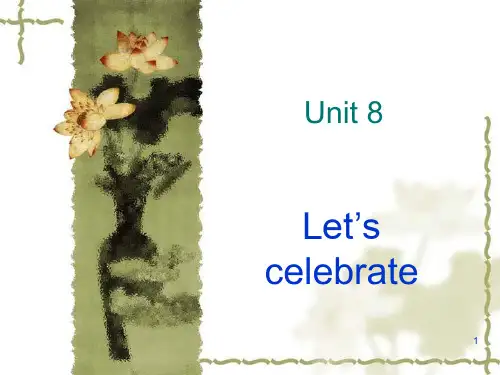剑桥国际英语教程册Unit
- 格式:ppt
- 大小:11.71 MB
- 文档页数:12
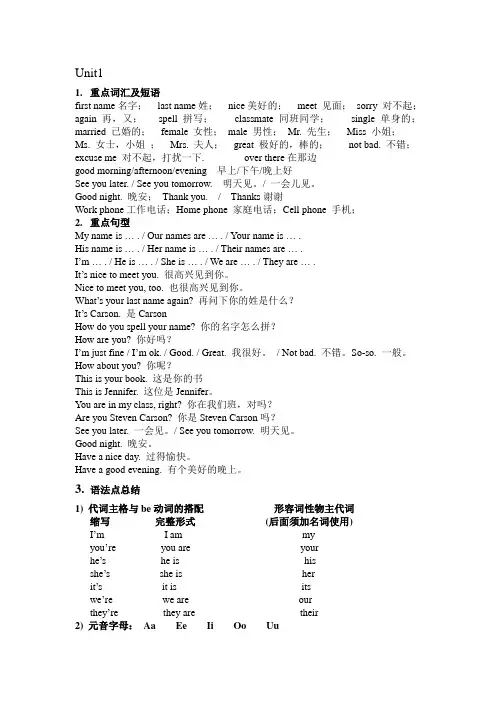
1.重点词汇及短语first name名字;last name姓;nice美好的;meet 见面;sorry 对不起;again 再,又;spell 拼写;classmate同班同学;single 单身的;married 已婚的;female 女性;male 男性;Mr. 先生;Miss 小姐;Ms. 女士,小姐;Mrs. 夫人;great 极好的,棒的;not bad. 不错;excuse me 对不起,打扰一下. over there在那边good morning/afternoon/evening 早上/下午/晚上好See you later. / See you tomorrow. 明天见。
/ 一会儿见。
Good night. 晚安;Thank you. / Thanks谢谢Work phone工作电话;Home phone 家庭电话;Cell phone 手机;2.重点句型My name is … . / Our names are … . / Your name is … .His name is … . / Her name is … . / Their names are … .I’m … . / He is … . / She is … . / We are … . / They are … .It’s nice to meet you. 很高兴见到你。
Nice to meet you, too. 也很高兴见到你。
What’s your last name again? 再问下你的姓是什么?It’s Carson. 是CarsonHow do you spell your name? 你的名字怎么拼?How are you? 你好吗?I’m just fine / I’m ok. / Good. / Great. 我很好。
/ Not bad. 不错。
So-so. 一般。
How about you? 你呢?This is your book. 这是你的书This is Jennifer. 这位是Jennifer。
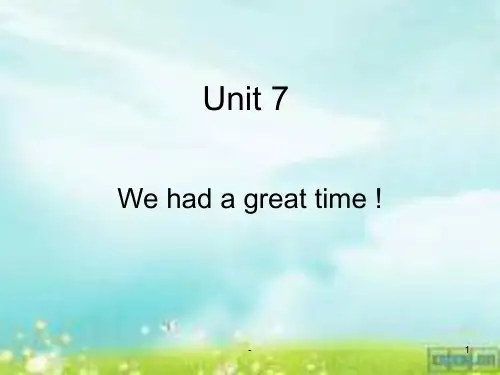

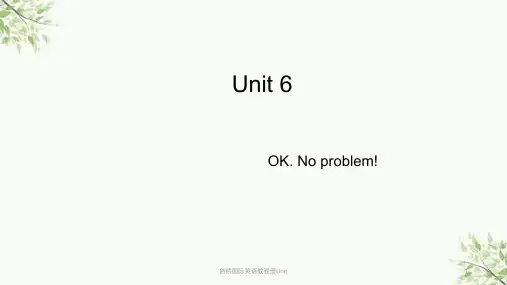
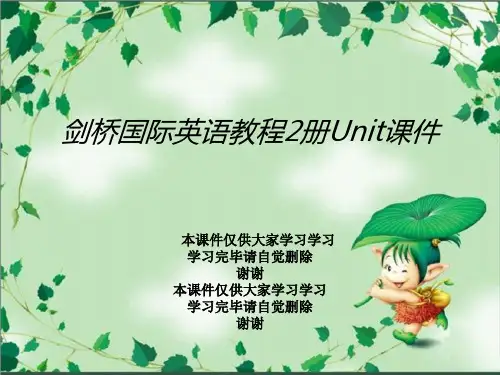
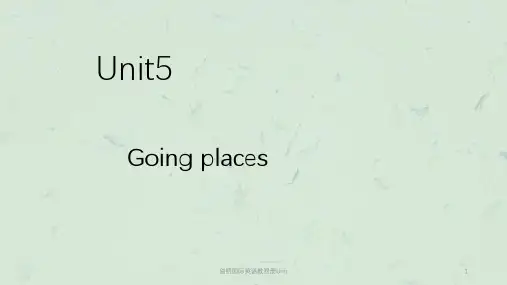
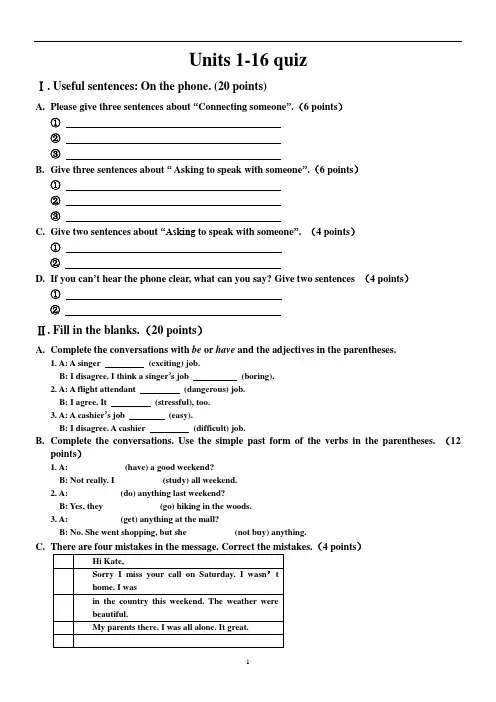
Units 1-16 quizⅠ. Useful sentences:On the phone. (20 points)A.Please give three sentences about “Connecting someone”.(6 points)①②③B.Give three sentences about “ Asking to speak with someone”.(6 points)①②③C.Give two sentences about “Asking to speak with someone”. (4 points)①②D.If you can’t hear the phone clear, what can you say? Give two sentences (4 points)①②Ⅱ. Fill in the blanks.(20 points)plete the conversations with be or have and the adjectives in the parentheses.1. A: A singer (exciting) job.B: I disagree. I think a singer’s job (boring).2. A: A flight attendant (dangerous) job.B: I agree. It (stressful), too.3. A: A cashier’s job (easy).B: I disagree. A cashier (difficult) job.plete the conversations. Use the simple past form of the verbs in the parentheses. (12points)1. A: (have) a good weekend?B: Not really. I (study) all weekend.2. A: (do) anything last weekend?B: Yes, they (go) hiking in the woods.3. A: (get) anything at the mall?B: No. She went shopping, but she (not buy) anything.C.There are four mistakes in the message. Correct the mistakes.(4 points)Hi Kate,Sorry I miss your call on Saturday. I wasn’thome. I wasin the country this weekend. The weather werebeautiful.My parents there. I was all alone. It great.Talk to you soon,BrendaD.Unscramble the sentences.(4 points)1.(the; there isn’t; a mirror; in; bedroom)2. (no; pictures; the hall; there are; in)Ⅲ. Reading. (40 points)AEvery year there is a Spring Festival in China. Usually it is in January or February. It is the most important festival in China. So before it comes,everyone has to prepare things. They buy pork,beef,chicken,fruits and many other things. And they often make a special kind of food—“dumplings”. It means “come together”.On the day before the festival,parents buy new clothes for their children. Children also buy presents for their parents. On the Spring Festival Eve(除夕),all the family members come back to their hometown. This is a happy moment. Some sing and dance,some play cards and others get the dinner ready. When they enjoy the meal,they give each other the best wishes for the coming year. They all have a good time.1. Which is the most important festival in China?A. The Mid-Autumn Festival.2. When the Chinese Spring Festival is usually celebrated?A. In March or April.B. In May or June.3. What is the special kind of food for the Spring Festival in China?A. ChickenB. Dumpling4. What’s the meaning of the food “dumplings” for Chinese people in the Spring Festival?A. Look up.B. Help yourself.5. The familyA. give each other the best wishesC. sing,BStress(压力)is everywhere in our everyday life. Not only men have it, but also women and young people. The most important reasons of stress are:death, diseases, exams, making money, getting married, moving houses, changing jobs, ending friendships and so on.How do you know whether you have stress? Could you give your answers to the following questions?Yes or NoDo you easily get angry?Do you often sleep badly?Do you get headaches a lot?Do you take sleeping pills?Do you find it difficult to relax?Do you usually hide your feelings?Do you smoke and drink a lot to keep quiet?Do you find it difficult to put your heart into something?If you answer “Yes” to more than two of these questions, you are one of those people with stress. So what can you do about it?Doing relaxing exercises, talking with friends and listening to light music are all usual ways of relieving(减轻)stress. However, doctors now say that there are easier ways—people should laugh and smile more often. When you laugh and smile, your body relaxes. They also say that people, especially men, should cry more often, because crying is the natural way of relieving stress.6. Who has got stress in everyday life?A. Men and women.B. Young people.C. Both A and B.7. If you have over problems listed in the table, you are the person with stress.A. twoB. threeC. eight8. Which of the followings is NOT the reason of stress?A. Taking exams.B. Taking sleeping pills.C. Making money.9. What’s the easier way to relax your body?A. Talking with friends.B. Doing relaxing exercises.C. Laughing, smiling and crying.10. The main idea of the passage is .A. about stress and how to relieve your stressB. that there are many reasons for having stressC. that laughing and smiling more can help relieve your stressCThe Water World Swimming Pool is open every day from eight o’clock in the morning until half past seven in the evening. It costs two dollars sixty to enter the pool. There is a special cheap price for students with a student card. The price is one dollar forty. But you must bring your student card with you.On Wednesday morning the pool is only open to mothers and babies. So mothers can enjoy themselves in the water with their babies. Please leave your older children at home on Wednesday morning.The new Water World Café will be open up on June 22nd. From the caféyou can watch the swimmers or enjoy a drink after you swim.Please call 2105369 for more information. We look forward to seeing you at the Water World Swimming Pool.11.How long is the Water World Swimming Pool open every day?A. Eleven hours.B. Seven hours.C. Eleven and a half hours.D. Seven and a half hours.12. What is the price for students with a student card to enter the pool?A. Two dollars.B. One dollar forty.C. Two dollars sixty.D. One dollar.13. A ten-year-old boy can’t go to the Water World Swimming Pool.A. on SaturdayB. on SundayC. on Wednesday afternoonD. on Wednesday morning14. From the café you can watch the swimmers or enjoy a drink after you swim ___________.A. on May 21stB. on May 22ndC. on June 23rdD. on June 21st15. This passage is a (n) .A. advertisementB. noteC. storyD. sloganDMr. Brown was going away for a week. Before he left, he said to his son, "If anyone asksfor me, you can tell him that your father has been out for doing something, and will be back ina week, then be sure to ask him to sit down for a cup of tea.""OK, Dad," said his son. But he was afraid his soncouldn't remember this, he wrote these words down on a piece of paper and gave it to him. His son put it into his small pocket, took it out and looked at it every now and then.Four days passed, but no one came to see his father. The boy thought that there was no man to come and that the piece of paper was of no more use for him, so he burnt it that evening.The next afternoon, someone knocked at the door. The boy opened it. A man was standing at the door and said, "Where is your father?" The boy put his hand into his pocket at once and looked for the piece of paper.He could not find it. He suddenly remembered he had burnt it, so he shouted, "No more.” The man was very surpri sed. He asked, "No more? I met your father last week. When did it happen?” Burnt yesterday evening."16. Mr. Brown told his son that _____.A. he would be away from home for four daysB. he would be back in seven daysC. he would be back in a monthD. he liked a cup of tea17. Mr. Brown wrote the words down on ________.A. the wallB. the doorC. a piece of paperD. his son's pocket18. A man came to visit the boy's father on ________.A. the second dayB. the third dayC. the fourth dayD. the fifth day19. The man was very surprised because _________.A. he thought the child's father was deadB. the child didn't ask him to sit downC. the child gave him a cup of teaD. he couldn't find that piece of paper20. What was burnt? ___________.A. The piece of paperB. Mr. SmithC. The visitorD. The boyⅣ. Translation. (20 points)1.The other students in the class must__ __________ _____ (闭着眼睛).2.You must look after yourself and____ ________________ (保持健康).3.._____________________ (顺便问一下), why did you call me?4.She wasn't here __ ______________ (刚才).5.They can watch the football match___ ___________ (同时).6.What are you going to be when you______________ (长大)?7.She___ _____________ (出生)in Tianjin .8.Where were you__ ___________ ___ (昨天上午)?9.I got here ______ ___ (半小时前).10..___ ______ (起先) I found it very difficult, but now I can understand most of the lessons. Ⅴ. Writing. (10 points)Find the differences.。
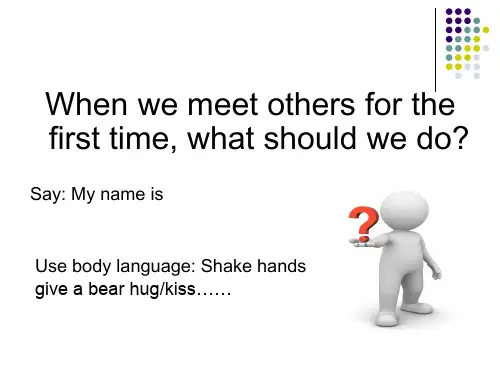
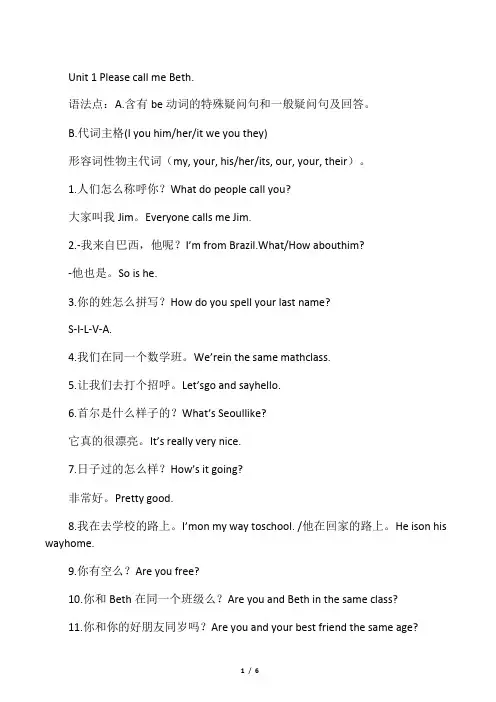
Unit 1 Please call me Beth.语法点:A.含有be动词的特殊疑问句和一般疑问句及回答。
B.代词主格(I you him/her/it we you they)形容词性物主代词(my, your, his/her/its, our, your, their)。
1.人们怎么称呼你?What do people call you?大家叫我Jim。
Everyone calls me Jim.2.-我来自巴西,他呢?I’m from Brazil.What/How abouthim?-他也是。
So is he.3.你的姓怎么拼写?How do you spell your last name?S-I-L-V-A.4.我们在同一个数学班。
We’rein the same mathclass.5.让我们去打个招呼。
Let’sgo and sayhello.6.首尔是什么样子的?What’s Seoullike?它真的很漂亮。
It’s really very nice.7.日子过的怎么样?How’s it going?非常好。
Pretty good.8.我在去学校的路上。
I’mon my way toschool. /他在回家的路上。
He ison his wayhome.9.你有空么?Are you free?10.你和Beth在同一个班级么?Are you and Beth in the same class?11.你和你的好朋友同岁吗?Are you and your best friend the same age?12.一会见。
See you later.明天见。
See you tomorrow.13.祝你愉快。
/祝你度过快乐的一天。
Have a good day.*14. Name is an important part of your identity.名字是你身份的重要组成部分。
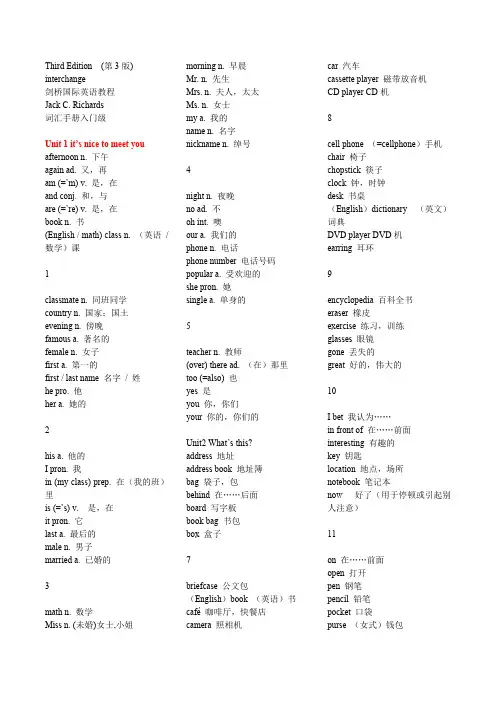
Third Edition (第3版) interchange剑桥国际英语教程Jack C. Richards词汇手册入门级Unit 1 it’s nice to meet you afternoon n. 下午again ad. 又,再am (=’m) v. 是,在and conj. 和,与are (=’re) v. 是,在book n. 书(English / math) class n. (英语/ 数学)课1classmate n. 同班同学country n. 国家;国土evening n. 傍晚famous a. 著名的female n. 女子first a. 第一的first / last name 名字/ 姓he pro. 他her a. 她的2his a. 他的I pron. 我in (my class) prep. 在(我的班)里is (=’s) v. 是,在it pron. 它last a. 最后的male n. 男子married a. 已婚的3math n. 数学Miss n. (未婚)女士,小姐morning n. 早晨Mr. n. 先生Mrs. n. 夫人,太太Ms. n. 女士my a. 我的name n. 名字nickname n. 绰号4night n. 夜晚no ad. 不oh int. 噢our a. 我们的phone n. 电话phone number 电话号码popular a. 受欢迎的she pron. 她single a. 单身的5teacher n. 教师(over) there ad. (在)那里too (=also) 也yes 是you 你,你们your 你的,你们的Unit2 What’s this?address 地址address book 地址簿bag 袋子,包behind 在……后面board 写字板book bag 书包box 盒子7briefcase 公文包(English)book (英语)书café 咖啡厅,快餐店camera 照相机car 汽车cassette player 磁带放音机CD player CD机8cell phone (=cellphone)手机chair 椅子chopstick 筷子clock 钟,时钟desk 书桌(English)dictionary (英文)词典DVD player DVD机earring 耳环9encyclopedia 百科全书eraser 橡皮exercise 练习,训练glasses 眼镜gone 丢失的great 好的,伟大的10I bet 我认为……in front of 在……前面interesting 有趣的key 钥匙location 地点,场所notebook 笔记本now 好了(用于停顿或引起别人注意)11on 在……前面open 打开pen 钢笔pencil 铅笔pocket 口袋purse (女式)钱包Relax. 别担心。
